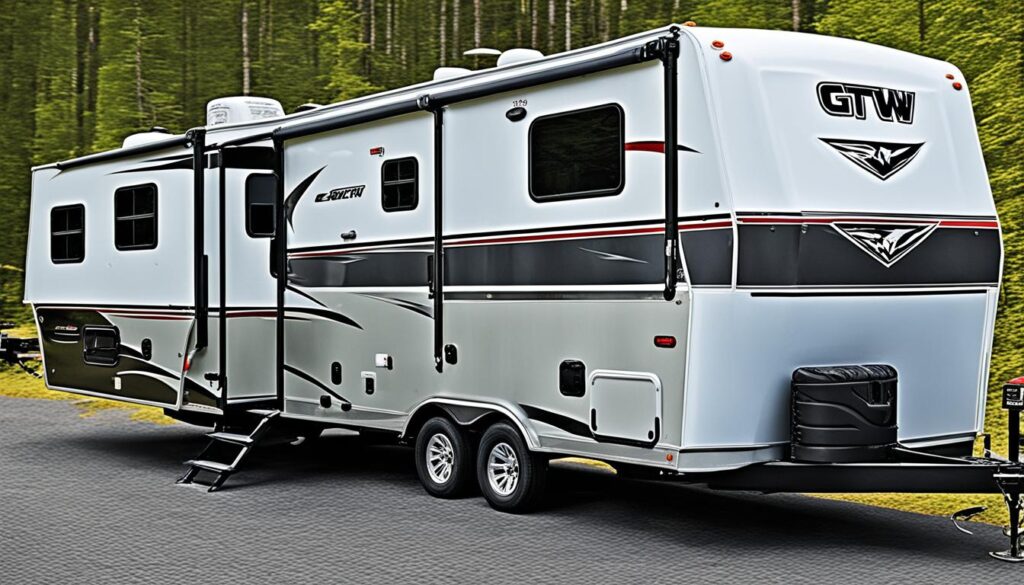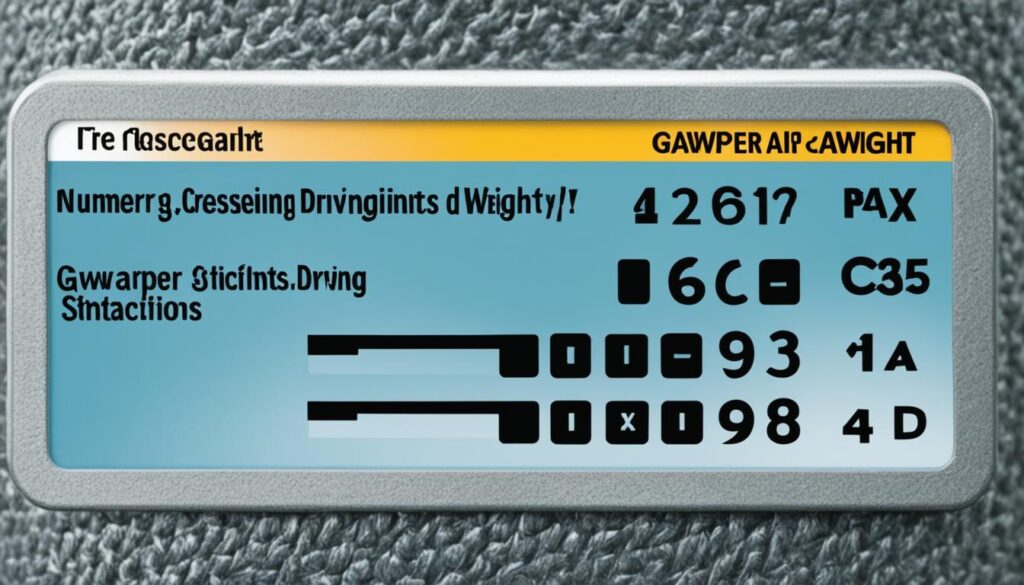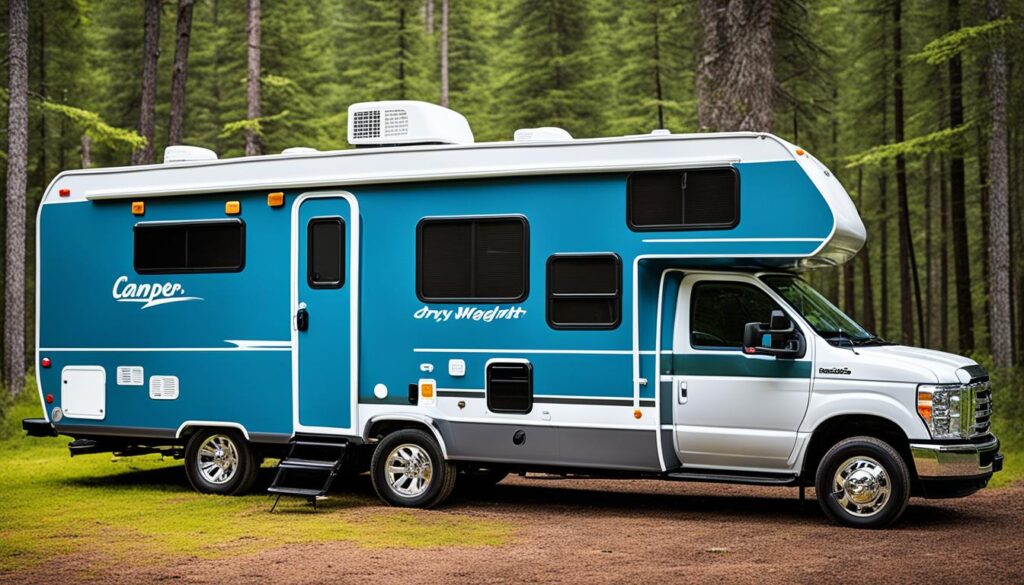When it comes to campers, there are various weight measurements used to determine their capabilities and limitations. But what exactly do terms like Gross Weight and Dry Weight mean? And why do they matter?
Many people assume that the weight of a camper is simply the weight of the vehicle itself. However, the truth is that there is more to it than meets the eye. Understanding the difference between Gross Weight and Dry Weight is crucial for ensuring safe towing, packing, and operation of a camper.
In this article, I will explain the meanings of terms such as Gross Vehicle Weight (GVW), Gross Trailer Weight (GTW), Gross Vehicle Weight Rating (GVWR), Unloaded Vehicle Weight (UVW), and Dry Weight. By the end, you’ll have a clear understanding of these weight definitions and their significance in determining the limits and capabilities of a camper.
Key Takeaways:
- Gross Weight and Dry Weight are two different weight measurements used to determine the capabilities of a camper.
- Gross Weight includes the weight of the vehicle or trailer, all cargo, fluids, passengers, and optional equipment.
- Dry Weight is the weight of a vehicle or trailer without fuel, fluids, cargo, passengers, or optional equipment.
- Gross Weight and Dry Weight play a crucial role in determining towing capacities and payload capacities of campers.
- Understanding these weight definitions is essential for safe operation and avoiding overloading of campers.
Contents
What is Gross Vehicle Weight (GVW)?
Gross Vehicle Weight (GVW) refers to the actual weight of a fully loaded vehicle or trailer, including all cargo, fluids, passengers, and optional equipment. It is a crucial value to consider when determining if a vehicle or trailer is within the weight limits set by the manufacturer, laws, and regulations.
Estimating the GVW is important for ensuring safe and legal operation of the vehicle or trailer. By approximating the GVW based on information provided by the manufacturer or dealer, individuals can better understand the capacity and limitations of their vehicle or trailer.
GVW encompasses all the weight carried by the vehicle or trailer, including any additional items that contribute to its overall mass. This comprehensive measurement is essential for avoiding overloading and potential safety hazards on the road.
To illustrate the importance of GVW, here’s an example:
“Imagine you have a camper van and plan a road trip with your family. Before embarking on your adventure, it is crucial to understand the GVW of the camper van. This includes considering the weight of your family members, fuel, camping gear, and any other items you plan to bring along. By ensuring that the GVW remains within the recommended limits, you can enjoy a safe and worry-free journey.”
Determining GVW: Manufacturer and Dealer Information
The manufacturer or dealer typically provides information about the GVW of a vehicle or trailer. This includes the maximum permissible GVW, as well as any weight restrictions based on specific configurations or optional equipment.
It is important to carefully review the specifications provided by the manufacturer or dealer and understand how they apply to the GVW of your vehicle or trailer. By adhering to these guidelines, you can ensure the longevity and safety of your vehicle or trailer.
Visualizing GVW
An effective way to comprehend the concept of GVW is through a visual representation. The following table provides a hypothetical example to illustrate how different components contribute to the GVW of a camper trailer:
| Component | Weight (lbs) |
|---|---|
| Base Trailer Weight | 2,500 |
| Camping Gear | 300 |
| Fuel | 200 |
| Water Tank | 250 |
| Propane Tank | 50 |
| Total GVW | 3,300 |
The table above illustrates the hypothetical GVW of a camper trailer, showcasing how the base weight of the trailer is augmented by various components such as camping gear, fuel, water, and propane tanks. Understanding these associated weights can assist in planning and packing for a safe and comfortable camping experience.
Having a clear understanding of the Gross Vehicle Weight is essential for responsible vehicle and trailer operation. By respecting these weight limits, individuals can ensure a safer and more enjoyable travel experience for themselves and everyone on the road.
What is Gross Trailer Weight (GTW)?
In the world of towing and trailers, understanding the concept of Gross Trailer Weight (GTW) is essential. GTW refers to the total weight of a trailer when it is fully loaded and connected to a tow vehicle. It is the same as Gross Vehicle Weight (GVW) when we talk about trailers.
When a trailer is connected to a tow vehicle, some of its weight is transferred to the tow vehicle through the hitch. This includes not only the weight on the trailer’s axles but also the tongue weight or king pin weight. GTW takes into account all of these factors, giving you a comprehensive measure of the total weight being towed.
The significance of GTW lies in its role in determining whether a tow vehicle is capable of safely towing a particular trailer. Every tow vehicle has a limit to the amount of weight it can handle, and exceeding this limit can lead to stability issues, decreased braking performance, and potential damage to the vehicle or trailer.
In order to ensure a safe and smooth towing experience, it is important to have a clear understanding of the GTW of your trailer and compare it to the towing capacity of your vehicle. By staying within the recommended GTW limits, you can help prevent accidents and ensure the longevity of both your vehicle and trailer.
Now, let’s take a look at a table comparing the GTW of three popular trailer models:
| Trailer Model | Gross Trailer Weight (GTW) |
|---|---|
| Model A | 5,000 lbs |
| Model B | 7,500 lbs |
| Model C | 9,000 lbs |

Understanding Gross Vehicle Weight Rating (GVWR)
Gross Vehicle Weight Rating (GVWR) plays a crucial role in ensuring the safe operation of vehicles and trailers. It is the maximum weight that the Gross Vehicle Weight (GVW) or Gross Trailer Weight (GTW) should never exceed.
GVWR is an important rating set by manufacturers to prevent overloading and maintain the structural integrity and performance of vehicles and trailers. It encompasses the weight of the vehicle or trailer itself, along with all cargo, fluids, passengers, and optional equipment.
The significance of GVWR lies in its ability to determine the maximum load capacity, ensuring that vehicles and trailers are not pushed beyond their design limits. By adhering to the GVWR, individuals can prevent excessive stress on tires, axles, suspensions, and other critical components, reducing the risk of accidents, breakdowns, and costly repairs.
Exceeding the GVWR can compromise the vehicle or trailer’s stability, maneuverability, and braking efficiency, making it more susceptible to accidents and reducing overall performance. Additionally, violating GVWR regulations may have legal consequences, as it can result in fines or penalties in many jurisdictions.
“Adhering to the GVWR ensures that vehicles and trailers are not overloaded, maintaining their safety and performance.”
Understanding the GVWR of your vehicle or trailer is imperative for ensuring safe travels and avoiding potential issues. Before embarking on a journey or adding any additional weight, it is crucial to familiarize yourself with the manufacturer’s specified GVWR and evaluate the combined weight of all passengers, cargo, fluids, and optional equipment.
Why is GVWR important?
The importance of GVWR cannot be overstated. It serves as a safeguard against overloading, protecting both the vehicle or trailer and its occupants. By adhering to the GVWR, you ensure the following:
- Optimal Performance: Staying within the GVWR allows your vehicle or trailer to operate efficiently without straining the engine, transmission, and other vital components.
- Braking Safety: Exceeding the GVWR can affect the braking system’s ability to stop the vehicle or trailer within a safe distance, leading to potential accidents.
- Tire Durability: Properly loading your vehicle or trailer within the GVWR ensures that the tires can adequately support the weight, preventing premature wear, and maintaining optimal traction.
- Legal Compliance: Following GVWR regulations helps you avoid legal issues and penalties, ensuring your compliance with local, state, and federal regulations.
Ultimately, understanding and adhering to the GVWR enables safe and worry-free travels, preserving the longevity and performance of your vehicle or trailer while keeping you and your loved ones safe on the road.
| Key Points | Benefits |
|---|---|
| Prevents Overloading | Preserves vehicle or trailer performance and safety |
| Maintains Structural Integrity | Minimizes the risk of accidents and costly repairs |
| Ensures Legal Compliance | Avoids fines and penalties |
| Optimizes Braking Safety | Promotes efficient stopping distance |
| Prolongs Tire Durability | Reduces premature wear and ensures traction |
The Importance of Gross Axle Weight Rating (GAWR)
When it comes to ensuring the safety and performance of your vehicle or trailer, understanding the Gross Axle Weight Rating (GAWR) is crucial. GAWR refers to the maximum weight that a single axle should never exceed. This rating plays a vital role in distributing weight properly and preventing axle overload.
Just like the Gross Vehicle Weight Rating (GVWR), which accounts for the total weight of a vehicle or trailer, the GAWR focuses specifically on the weight that each axle can safely carry. By considering the GAWR, you can ensure that your vehicle or trailer is loaded within the recommended limits, reducing the risk of accidents and damage to your vehicle or trailers.
It’s important to note that there may be specific ratings for the rear axle (RGAWR) and the front axle (FGAWR). These separate ratings allow for a more precise distribution of weight and provide added safety and stability while driving.
Exceeding the GAWR can have detrimental effects on the handling and performance of your vehicle or trailer. It can lead to uneven weight distribution, causing excessive strain on axles, suspension systems, and tires. This can result in decreased maneuverability, increased stopping distance, and potential tire blowouts, putting you and other road users at risk.
By paying attention to the GAWR, you can ensure that your vehicle or trailer is loaded safely and within the specified weight limits. Distributing the weight evenly across all axles will optimize stability, handling, and performance, allowing for a smoother and more controlled driving experience.
It’s important to consult your vehicle or trailer’s manufacturer or owner’s manual to determine the specific GAWR ratings for your vehicle. Additionally, working with a professional to properly weigh your loaded vehicle or trailer can provide accurate data for determining if you are within the GAWR limits.
Recommended Practices for GAWR Compliance:
- Regularly inspect and maintain your vehicle or trailer, including axles, suspension systems, and tires, to ensure they are in good working condition.
- Weigh your vehicle or trailer fully loaded, considering all cargo, passengers, and optional equipment, to ensure it does not exceed the GAWR.
- Properly distribute the weight across all axles, ensuring that no single axle is overloaded.
- Consider upgrading your axles or suspension systems if you frequently carry heavy loads, to ensure they can safely handle the added weight.
- Always follow the manufacturer’s guidelines and recommendations for weight limits and distributions.
| GAWR | Definition | Significance |
|---|---|---|
| Rear Axle GAWR (RGAWR) | The maximum weight that the rear axle should never exceed | Ensures proper weight distribution and stability for the rear of the vehicle or trailer |
| Front Axle GAWR (FGAWR) | The maximum weight that the front axle should never exceed | Ensures proper weight distribution and stability for the front of the vehicle or trailer |
By understanding and adhering to the GAWR, you can optimize the safety, performance, and longevity of your vehicle or trailer. Keeping the weight within the designated limits for each axle will provide a more comfortable and secure towing or driving experience, giving you peace of mind on the road.

Understanding Unloaded Vehicle Weight (UVW)
When it comes to campers and trailers, one important weight measurement that you need to understand is Unloaded Vehicle Weight (UVW). This term refers to the weight of a vehicle as it is manufactured at the factory, without any added cargo, water, propane, or dealer-installed accessories.
The UVW includes the weight of the vehicle itself, the full fuel tank weight, and equipment fluids weight. It serves as a baseline measurement for determining the capacity of the camper to carry additional items.
UVW plays a vital role in calculating other weight factors such as cargo carrying capacity or payload. By knowing the UVW of your camper, you can better understand its limitations and make informed decisions when it comes to adding extra items.
Let’s take a closer look at the significance of UVW with an example:
Example: The UVW of a camper is 3,000 pounds. This means that without any additional cargo or accessories, the camper weighs 3,000 pounds at the factory. Understanding the UVW is crucial for determining the remaining weight capacity for adding items such as camping gear, food, and personal belongings.
To help you visualize the concept, here is a table comparing the UVW with the Gross Vehicle Weight Rating (GVWR) and Cargo Carrying Capacity (CCC) of a camper:
| Measurement | Definition |
|---|---|
| Unloaded Vehicle Weight (UVW) | The weight of a camper as manufactured at the factory, without any added cargo, water, propane, or dealer-installed accessories. |
| Gross Vehicle Weight Rating (GVWR) | The maximum weight that the camper, including all cargo, fluids, passengers, and optional equipment, should never exceed. |
| Cargo Carrying Capacity (CCC) | The maximum weight of additional cargo that the camper can safely carry, calculated as the difference between the GVWR and UVW. |
Understanding the UVW is not only crucial for staying within the camper’s weight limits but also for ensuring safe and smooth travels. By knowing the UVW, you can pack and load your camper appropriately, optimizing its performance and minimizing the risk of overloading.
Defining Dry Weight
Dry Weight is a crucial factor to consider when assessing the capabilities of a camper. It refers to the actual weight of a vehicle or trailer, including standard equipment, but excluding fuel, fluids, cargo, passengers, and optional equipment. The definition of Dry Weight may vary among manufacturers and may or may not include commonly ordered optional equipment or RV batteries.
The significance of Dry Weight lies in its use as a baseline for calculating other weights, such as cargo carrying capacity or payload. By knowing the Dry Weight, campers can determine how much additional weight they can safely add to the vehicle or trailer without exceeding its capacity or limitations.
It is important to refer to the manufacturer’s definition of Dry Weight to ensure accuracy and make informed decisions when loading a camper. By adhering to the specified Dry Weight limits, campers can maintain the stability, balance, and overall safety of their vehicles or trailers.
Understanding Dry Weight helps campers make informed choices about the items they carry, ensuring that they do not exceed the recommended limits and compromise the performance and safety of their campers.
Understanding Cargo Weight
Cargo Weight refers to the actual weight of all items that are added to the Curb Weight of a vehicle or trailer. This includes personal cargo, optional equipment, as well as the tongue or king pin weight. In essence, Cargo Weight encompasses everything that you bring along with you on your camping trips.
When it comes to packing and loading a camper, understanding the importance of Cargo Weight is crucial. It determines how much additional weight can be safely carried, ensuring that you do not overload the camper, and in turn, maintaining safe operation.
By knowing the Cargo Weight capacity of your camper, you can make informed decisions about what to bring on your trips and how to distribute the weight properly. This helps optimize both safety and performance, ensuring a smooth and enjoyable camping experience.
FAQ
What is the difference between gross weight and dry weight?
Gross weight refers to the actual weight of a fully loaded vehicle or trailer, including all cargo, fluids, passengers, and optional equipment. Dry weight, on the other hand, refers to the weight of a vehicle or trailer containing standard equipment without fuel, fluids, cargo, passengers, or optional equipment.
What is the definition of gross weight and dry weight?
Gross weight is the actual weight of a fully loaded vehicle or trailer, while dry weight is the weight of a vehicle or trailer without additional items such as fuel, fluids, cargo, passengers, or optional equipment.
What is the significance of gross weight and dry weight?
Understanding gross weight and dry weight is important for determining the limits and capabilities of a camper. Gross weight helps ensure that a vehicle or trailer is within the limits set by the manufacturer and regulations, while dry weight provides information on the base weight of the vehicle or trailer.
What is the difference between gross weight and net weight?
Gross weight refers to the total weight of a vehicle or trailer with all cargo, passengers, fluids, and optional equipment included. Net weight, on the other hand, refers to the weight of the vehicle or trailer without these additional items.
What is the definition of gross weight and net weight?
Gross weight is the actual weight of a fully loaded vehicle or trailer, while net weight is the weight of the vehicle or trailer without cargo, passengers, fluids, and optional equipment.
What is the difference between gross weight and dry weight?
Gross weight refers to the actual weight of a fully loaded vehicle or trailer, while dry weight refers to the weight of a vehicle or trailer containing standard equipment without fuel, fluids, cargo, passengers, or optional equipment.
What is the definition of gross weight and dry weight?
Gross weight is the actual weight of a fully loaded vehicle or trailer, while dry weight is the weight of a vehicle or trailer without additional items such as fuel, fluids, cargo, passengers, or optional equipment.
What is the difference between gross weight and net weight?
Gross weight refers to the total weight of a vehicle or trailer with all cargo, passengers, fluids, and optional equipment included. Net weight, on the other hand, refers to the weight of the vehicle or trailer without these additional items.
What is the definition of gross weight and net weight?
Gross weight is the actual weight of a fully loaded vehicle or trailer, while net weight is the weight of the vehicle or trailer without cargo, passengers, fluids, and optional equipment.
What is the difference between gross weight and dry weight?
Gross weight refers to the actual weight of a fully loaded vehicle or trailer, while dry weight refers to the weight of a vehicle or trailer containing standard equipment without fuel, fluids, cargo, passengers, or optional equipment.
What is the definition of gross weight and dry weight?
Gross weight is the actual weight of a fully loaded vehicle or trailer, while dry weight is the weight of a vehicle or trailer without additional items such as fuel, fluids, cargo, passengers, or optional equipment.






